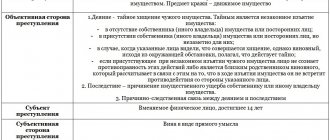The concept of theft includes the secret theft of property belonging to another person. The crime is punishable according to Art. 158 of the Criminal Code of the Russian Federation and is the most common type of criminal offense. Citizens who attempt theft often do not realize that, even without achieving the goal, they fall under a special article. According to the Criminal Code of the Russian Federation, such an act is considered criminal.
1,000 rubles - this should be the minimum value of property for the theft of which liability arises. In other cases, we are talking about an administrative violation, listed as petty theft, and this is set out in detail in Art. 7.27 of the Code of the Russian Federation.
Attention! Those who independently deal with a case related to attempted theft should keep in mind that:
- each case is individual and unique;
- knowing only the basics of the law does not guarantee a positive outcome;
- there are many factors that influence the result.
Responsibility for a crime
The criminal law provides for a fairly extensive list of punishments for crimes of varying severity. In the case of an attempted theft, everything is the same - the coercive measures will be different. Depending on the qualifying features, the severity of the punishment increases.
To understand what possible sanctions will be applied to a person, you must first understand what circumstances influence the crime. Circumstances aggravating the guilt of the subject include:
- committing a crime as part of a group of persons organized by or by prior conspiracy;
- penetration into a home and other private premises;
- the amount of damage is not less than 5 thousand rubles;
- theft from bags, pockets and other types of hand luggage;
- large amount of damage (at least 250 thousand rubles);
- theft from gas and oil pipelines;
- especially large damage from criminal acts (from one million rubles).
The presence of at least one of these signs significantly increases the punishment. If the crime is committed without their presence, and there is also an attempted petty theft, then most likely the subject will avoid being held accountable. Especially if he committed such an action for the first time.
Responsibility and punishment for attempted theft will be determined by the court, based on the case materials and the identity of the accused. Often, the circumstances that prevented the offender from completing the crime are also taken into account. For example, if the car alarm went off and the thief was unable to remove the radio in a timely manner, this poses a greater danger than such a circumstance as the offender’s ignorance of the radio’s structure, as a result of which he was unable to complete the theft.
It should be noted that attempted theft, like the theft itself, can be completed or not completed. An attempted theft is considered completed if the culprit does everything possible to achieve his goal, but fails to achieve the desired result. An example is a situation in which a buyer in a self-service store, having hidden a chocolate bar in his coat sleeve, tried to pass it through the payment center (checking whether the signal would beep or whether he would be able to carry the goods). This is a completed attempt at theft, but not yet theft.
An unfinished attempt at theft will occur when the criminal, against his own will, cannot carry out everything that he considers necessary to achieve his illegal goal. For example, a man entered a car in order to steal a fur hat lying on the front seat, but the driver of the car passing nearby noticed the criminal and did not allow him to pull out the hat.
For violating the law in the form of attempted theft, a person may be subject to the same penalties as for a completed crime. The violator may receive as a sanction:
- fine;
- compulsory work;
- correctional work;
- forced labor;
- deprivation of liberty;
- restriction of freedom.
It is very important to note that attempted theft is an unfinished form of violation; accordingly, the judge cannot impose a sanction in the same amount as for theft. The presiding officer has no right to assign to the violator more than ¾ of the maximum penalty for the violated article
Imprisonment is imposed only for theft on an especially large scale; for attempted theft, this sanction is assigned quite rarely. It is applied only in cases where all aggravating features are present and there is a relapse of the crime.
According to established legal norms, no one has the right to be held accountable without evidence. Until guilt is proven in court, the principle of innocence applies. That is why, if you are accused of attempted crime, demand evidence. It is also important to immediately contact a lawyer who will provide you with advice and ensure that your rights are fully respected.
Many people are mistaken in thinking that attempted theft is not a serious violation of the law. This is not so, theft in itself is considered a rather serious crime, because, as mentioned above, it implies punishment even in the form of imprisonment. At first glance, an insignificant attempt to take something you like out of the store can cause serious legal consequences, in particular, a criminal record, but it remains in the biography forever.
What to do in case of an attack on property?
When faced with an attempt (attempt) to steal your property, do not panic, but prepare to report the incident to the police. Sample statement of missing items:
- Provide details of the head of the police department.
- Full name of the victim, address, phone number, passport details.
- Details of the incident (date, time, place, circumstances of the incident, characteristic features of the place where the theft occurred, etc.)
- Describe the missing items.
- Please look into the matter and return the property to the owner.
- Signature and date of application.
Make sure the officer on duty accepts your application. This should be evidenced by the issuance of a special coupon to the victim.
Author of the article
Dmitry Leonov
Work experience 15 years, specialization - housing, family, inheritance, land, criminal cases.
Author's rating
721
Articles written
712
about the author
Useful information on criminal cases
- My wallet was stolen, what should I do?
- Evidence of shoplifting
- Criminal liability for robbery
- What is the punishment for stealing a phone?
- Theft with illegal entry into a home
- Pickpocketing
- Bicycle theft
- Attempted theft
- Passport theft
- Report of car theft
- Break-in
- What does a minor face for theft?
- What to do if your documents are stolen
- Car theft
- Liability for shoplifting
- Is it possible to withdraw a theft report?
- Petty theft
- Apartment robbery
- Stealing money
- Attempted car theft - article of the Criminal Code of the Russian Federation
- Sample statement to the police about theft of property
- Electricity theft
- Driver's license stolen
Recommendations
Theft can occur in a store, at an enterprise, on public transport, in a bank and in other places. How to deal with theft? Experts recommend developing a specific action plan aimed at stopping unlawful actions. Of course, its preparation should be carried out taking into account the characteristics of the team, enterprise, and other circumstances. For example, the security system in a factory and in a sales area will be significantly different. However, some general guidelines can be identified:
- Development of local regulatory documents. The established rules must be written down in special documents. Each subject should familiarize themselves with them. At the enterprise, much attention should be paid to work regulations and the content of job descriptions. The system of individual and collective financial responsibility is of no small importance. The development of local regulations is mainly about preventing theft.
- Formation of a control and accounting system. The head of the company should always have access to information about the product at each level of its movement. This will not only allow you to monitor the production process, but will also provide the opportunity to conduct a sudden inspection of it. Employees, in turn, if such a system is in place, will understand that any illegal action will definitely be detected.
- Checking a new employee. When applying for a job, a candidate provides a certain package of documents. They must be checked for authenticity. In addition, it is advisable to inquire about the previous place of work and request a reference for the employee from there. It is imperative to identify a person’s bad habits. In particular, the craving for gambling, drinking, etc. is of particular importance.
- Careful selection of employees for the management staff. It must be remembered that in any enterprise the administration acts as a standard, a model. She sets the tone for the work. Managers contribute to the creation of the image of the general director and shape the attitude of employees towards the head of the company. That is why the administrative apparatus must contain verified, and most importantly, honest people.
- Identification and harsh criticism of theft. Cases of detection of violations and identification of those responsible must be made public within the enterprise team. The manager should develop a scheme according to which he will have the opportunity to get rid of careless employees as soon as possible. In such cases, exceptions and concessions cannot be made under any circumstances. If local regulations establish strict rules and provide for specific measures aimed at combating theft, they must be strictly followed.
It should also be noted that it is extremely important to adhere to ethical standards when interacting with staff. In the process of counteracting and bringing to justice employees caught stealing, the rights of honest, conscientious employees must not be offended or in any way infringed.
Punishment should only be reserved for guilty persons.
Release from liability
A person can be released from liability provided that the amount (cost of the stolen property) is less than 1,000 rubles.
In addition, criminal law guarantees exemption from liability if a citizen independently refuses to continue the implementation of his criminal intent aimed at stealing valuables.
For example, a man took a bottle of cognac from the counter and decided to take it out of the store in his jacket sleeve, without paying anything. After a few minutes, he decided to return the alcohol and put the bottle back in its place.
In this case, they cannot be held liable. If the man had taken out the bottle, then liability would have arisen under an administrative violation - Article 7.27 of the Code of Administrative Offenses (petty theft).
This is a standard classification of shoplifting, when an item is taken from the shelves, or when something not very valuable is taken from the street. But there is no fact, there is no punishment.
In addition, administrative legislation does not provide for such concepts as attempt or preparation for theft, so in most cases there is no liability.
Punishment for attempting to steal from a store: criminal or administrative liability
Attempted theft, regardless of the place where the crime was committed or the object of the attack, falls under Art. 158 of the Criminal Code of the Russian Federation.
Moreover, if the cost of the stolen item is less than 1 thousand rubles, then such theft may be of an administrative nature and belong to the category of petty thefts.
Theft in large shopping centers and self-service stores are frequent cases from judicial practice . The reason for this is the availability of goods and open access to them.
Criminals manage to hide goods so quickly and reliably that even CCTV cameras cannot always record the crime.
If an attacker tried to leave the store with a stolen item, but was stopped by a security guard and called the police, then the actions of the culprit will be regarded as an encroachment (attempt) on someone else’s item.
What a thief faces for attempted theft largely depends on the management of the store where he committed the crime.
Often, a manager or department head does not want to contact the police, so he resolves the issue peacefully. As a result, the criminal pays a fine and compensation for damages for his actions.
Exemption from liability for attempting to steal someone else's property
The guilty person may be released from criminal liability if the amount of stolen property is less than 1 thousand rubles.
Also, the citizen will not be held accountable under Art. 158 of the Criminal Code of the Russian Federation if he refused to commit theft on his own initiative.
For example, he put a bottle of cognac in his pocket, for which he didn’t pay a penny, but before reaching the cash register, he decided to return the alcohol to the shelf. In this case, he cannot be brought to either administrative or criminal liability.
What punishment does an attacker face for attempting to steal without causing damage?
If the criminal wanted to steal someone else's property, but nothing came of it, and the attacker acted carefully: he did not hit or break anything, then the punishment for the attempted theft will depend on the value of the planned stolen property.
However, in most cases, the careless buyer is punished by sellers or store owners - they are required to pay 5 times the amount for the goods.
Material damage
It acts as one of the signs of the objective part of the crime. Material damage is associated with the forcible seizure of material assets. For petty theft committed by fraud, theft, embezzlement, misappropriation, administrative liability is provided (Article 7.27 of the Administrative Code). Material harm caused to the owner of a thing must have a causal connection with the actions of the subject who committed the unlawful act
When deciding whether there is or is no corpus delicti, the opinion of the owner of the stolen item is not taken into account as to whether there is property damage and whether the perpetrator needs to be held accountable. The value of illegally seized property is determined on the day the crime was committed
The amount of material damage is established on the date of the decision on collection with subsequent indexation.
Qualification of the crime
To determine the corpus delicti and prescribe penalties, law enforcement officers determine under what circumstances the crime was committed. In particular, whether the actions of the criminals are theft or robbery or robbery. If it is determined that no threats or violence were used against the owners of the stolen property during the theft, the investigation begins to clarify other circumstances:
- Was the crime committed by prior conspiracy or spontaneously? If it is possible to prove a preliminary conspiracy, the crime is classified under Part 2 of Article 158 of the Criminal Code.
- Whether the criminals were a non-permanent random group or an organized group of trained robbers.
- Have the group members been previously observed in this type of activity, have they committed thefts before in this group, and is the crime a repeat crime?
Also during the trial, attention will be paid to the presence of mitigating circumstances, whether the criminals can compensate for the damage to the victim and whether the latter agrees to a mitigation of the punishment. But, regardless of whether the criminals managed to sell the stolen goods or can return the property to the victim, the crime will be considered completed from the moment the theft is carried out
An unsuccessful theft attempt is classified under a different article - we will talk about this in a separate article.
Something is not clear? and get expert commentary
Attempted theft: Article 158 of the Criminal Code of the Russian Federation, types of punishments
- Penalties;
- performing compulsory and corrective labor;
- restriction of freedom;
- referral to forced labor (valid from 01/01/2017).
An attempt, when compared with a completed theft, is less dangerous in relation to society. That is why the legislature has reduced the punishment, and it cannot be more than three-quarters of the longest term of imprisonment or other type of sanctions due for the completed theft. If for the last type of offense a group of persons acting on the basis of a preliminary conspiracy is sentenced to 5 years, then in the same case, for attempted theft, the members of the group will receive 3 years and 7 months.
The Criminal Code of the Russian Federation obliges the court to take into account the circumstances why the theft was never completed. So, for example, if the theft of a radio from inside a car was interrupted by an alarm going off, then this situation has a greater degree of social danger than the attacker’s ignorance of the technical nuances of dismantling the radio.
Article 158 commentary
The object of encroachment is material assets. The object of the unlawful act is relations in the sphere of property. Theft is a crime with material elements. The subject of the encroachment may be:
- Money.
- Things that are created by human labor and have spiritual or material value.
- Documents acting as the equivalent of money.
- Securities.
The subject of theft may be documents of an intangible nature that have no value, but provide an opportunity to obtain property. Such documents, for example, include invoices and luggage receipts. Their theft for the purpose of subsequent use for the conversion of property in favor of the perpetrator or third parties is qualified as preparation for fraud.
Decoding concepts
Attempted theft is regarded under Article 158 of the Criminal Code of Russia only if the following signs of a crime are present:
- selfish purpose, i.e. the crime must have the intent to obtain benefits from the theft of property;
- gratuitous in nature, i.e. for the secretly seized property its cost will not be paid, no other property of equal value will be provided for it, or the cost will not be fully covered;
- the presence of material damage, i.e., if a crime were committed, the owner of the property would suffer damage. The amount of damage affects the measure of restraint. It is calculated from the value of the property at the time of the theft attempt or based on the conclusion of an expert commission.
The concept of theft, and, accordingly, attempted theft, includes only those acts that are aimed at secretly confiscating property that does not belong to the criminal, as well as property to which he does not have an alleged right.
The presumptive right to own property refers to the debt the victim owes to the offender. Accordingly, secret theft or its attempt is carried out to cover the debt. In this case, the crime will be regarded as arbitrariness and will fall under Article 330 of the Criminal Code of Russia.
You should know:
- the seizure of property is usually understood as the actual transfer of property from the owner to the criminal or other persons in whose favor the crime is committed;
- preparation of theft is considered to be thinking about the details of committing a crime, drawing up plans, searching, preparing related tools and other signs of an offense that provide conditions for the possibility of committing a crime;
- attempted theft is considered to be intentional actions aimed at committing an illegal act that is not completed for any reason dependent or independent of the offender.
If the offender can (has the potential) to complete the crime, but does not complete it, then the court may qualify this as a refusal to commit the crime.
In this case, the following factors are taken into account when making a decision:
- voluntary refusal to commit a crime;
- no attempts to commit this illegal act a second time;
- refusal of a crime due to its illegality, i.e. a crime is not committed due to the fact that criminal liability is provided for it. This rule is regulated by Article 31 of the Criminal Code of Russia.
Voluntary renunciation of attempted theft
There are often cases when, when attempting to commit theft, an attacker consciously refuses to complete his actions. He may abort the attempt for various reasons:
- subjective (a complete attempt may result in a long prison term, etc.);
- objective (complex security system, lack of access to the object of theft, etc.).
If the offender refuses voluntarily, consciously and completely, then his actions are classified as an attempt according to the Criminal Code of Russia. In case of voluntary renunciation of intention, according to Article 158 of the Criminal Code of the Russian Federation, the offender is not subject to criminal prosecution.
How to distinguish theft from misappropriated finds
Found property is considered to be a thing that has ceased to belong to the owner or legal owner.
It is very important that at the time of appropriation by the perpetrators it can be identified as an unattended item. . If you find an item in a vehicle or in a room, you must hand it over: in the first case, to the conductor and driver, in the second, to the manager and representative of the room (for example, in a library, to a librarian)
If you find an item in a vehicle or in a room, you must hand it over: in the first case, to the conductor and driver, in the second, to the manager and representative of the room (for example, in a library, to a librarian).
Then this person is considered the finder, and he is obliged to call the police or other authorities, notifying them of the find.
Important points:
- The property must be removed from the owner's possession, but not from his control. A simple example: a person lost his wallet at work: but not in the office, but, say, in the corridor of the organization where he works. The appropriation of such a wallet by another person will be considered theft.
- Property that has finally left the owner’s possession will already be treated as a find. If you find a phone in the middle of a street or square, then you did not steal it. But there are ways to return the find to the owner: write an advertisement, give it to the police. Although this is already a matter of conscience.
Appropriation of what is found is a point that also has to be proven. Therefore, try to return any find to the copyright holder in some real way: give it to the police, write an advertisement on social networks, etc.
What is the difference between theft and robbery? Read about it here.
Can they be released from criminal liability for attempted theft?
The Criminal Code of the Russian Federation states that when assigning punishment for attempting to commit a crime, it is necessary to take into account all the circumstances that prevented the offender from completing the act he began.
They can be released from liability if they turn themselves in.
Let’s say a citizen decided to commit a theft, but at the moment the illegal actions began, he changed his mind or simply got scared and decided not to carry out his plans. In this case, he can count on leniency from the law, and, accordingly, avoiding criminal liability.
The same rule also applies in cases where a person, after being detained by the police, realized his mistake and decided to admit his guilt to law enforcement agencies, as well as report all the nuances of the situation.
Objective and subjective signs
A crime is characterized by an action (inaction) aimed at realizing criminal intent, constituting its objective side. For the most part, it comes down to actions.
It all depends on the type of theft. In accordance with the first part, the beginning of the attempt coincides with the beginning of the criminal’s actions aimed at committing a crime.
If the qualification is under paragraph “a” of part 3 of the article, the beginning of the attempt to commit a crime will be considered the moment when the offender illegally ended up in someone else’s premises.
The object of the crime being committed is property relations. The object at which the intent is directed is all valuables, including money and property.
A crime is committed only with direct intent - a sign of the objective side. This point is key, since it is it that indicates that the act poses a danger to society.
This means that the criminal not only assumed, but initially knew about the illegality of his intentions and still tried to do everything necessary to commit the planned theft.
Only a person with full legal capacity, aged 14 years or older, can be charged under this article. It is such persons who act as subjects of crime from the point of view of criminal law.
Watch the video. Theft (Article 158 of the Criminal Code of the Russian Federation):
Objective signs
An attempted theft is the same crime as the commission of a completed theft with a preliminary conspiracy to do so, which entailed the theft and embezzlement of other people's money, property, and so on. The only difference is the moment of initiation of the case and the qualification of the actions of the guilty person.
Also read: What is petty theft and up to what amount is it considered petty?
For an act such as attempted theft, Article 158 of the Criminal Code of the Russian Federation will not be a sufficient remedy for the meaning of the punishment. It is mandatory to apply an additional norm - Article 30, Part 3 of the Criminal Code of the Russian Federation.
Regardless of whether there was an attempted theft, Article 158 of the Criminal Code of the Russian Federation is applied independently or several rules are established at once, and it is necessary to determine the composition of the act. It includes four required elements. Without such signs, it will be impossible to initiate proceedings.
The first group of such elements is objective in nature and includes the following:
- Objective side. It acts as a manifestation of crime in the external environment. Attempted theft. Articles 158 and 30 of the law assume that a person expressed an intention to steal property, committed illegal entry into a storage facility or home, removed the subject of the act, but for reasons beyond his control was unable to complete the action. Since theft is considered completed when a person can dispose of the stolen property, then the attempt is recognized as an unfinished version of the assault. The most common example of attempted theft is theft from a store or during dismissal, when a person is caught in the act, preventing him from removing the stolen property and causing damage to the owner.
- An object. In this situation, social relations suffering from criminal acts relate to issues of property. It is important to understand that when attempting to steal, the article of the Criminal Code of the Russian Federation does not provide for harm to the health or life of other persons, otherwise the act will be reclassified as robbery or robbery.
To distinguish between completed and unfinished versions of secret theft, it is enough to determine the fate of the stolen items.
Attempted theft under Article 30 is often correlated with theft, which does not involve disposal of the stolen vehicle. However, to differentiate, it is enough to determine the goal of the criminal. If he wants to dispose of the vehicle, but is forced to abandon it, then this is an attempt at theft; if he simply uses the car temporarily and then abandons it on his own initiative, this is theft.
What it is
Any socially dangerous act requires the presence of several stages of its implementation.
Theft is the secret theft of someone else's property, does not involve violence or the use of weapons, but allows the participation of a group of people and the use of means to enter the premises.
The result of such an act should always be damage: significant, large or especially large. Petty theft does not provide for criminal liability if it was committed for the first time.
Such a concept as an attempt represents the stage of implementation of an attack. Its commission occurs after preparatory actions. To attempt ─ means to begin to implement the objective side of the crime, that is, to make an attempt to steal someone else's property.
An attempt to secretly steal property under Article 30 must meet certain criteria:
- actual seizure of property;
- stopping criminal acts for reasons beyond the control of the guilty person;
- the absence of the fact of completion of actions, that is, the possibility of disposing of property for personal gain.
If a person himself refused to further commit criminal acts and surrendered, this can be regarded as a voluntary refusal, but provided that there is no serious damage.
Separately, it should be said about such a type of attempt to commit a crime as a bad attempt to commit a crime. It involves the use of means that are unsuitable for the actions in question, or an attack on an unsuitable object. At the same time, this option does not exclude liability, since the person had the intent to commit such an offense, as evidenced by judicial practice in the Resolutions of the Plenum of the Armed Forces of the Russian Federation.
Features of the assassination attempt
The classification of types of theft is related to their characteristics. It is the common features of all types of theft that distinguish them from other offenses, for example, administrative ones. Attempted crimes are characterized by:
- Having a goal. When committing an illegal event, an attacker always pursues a selfish goal - to steal and then appropriate someone else’s property for himself. According to the law, in order to convict the perpetrator of a crime, the fact of selfish purpose must be proven. In the case of an attempt (attempt), to establish a cause-and-effect relationship with possible consequences that were prevented by certain circumstances.
- Property issue. The crime always includes property, even in monetary terms. By breaking the law, the thief turns his attention to someone else's property. Theft begins from the moment the attacker steals this property. In our case, an attempt at secret theft is also equivalent to a criminal offense, albeit to a lesser extent.
- The secrecy of the crime. Theft is the secret nature of the theft of other people's things (for example, by entering an apartment). Once the owner of the property discovers the loss, he will become the injured party in the criminal case. From this moment the fact of violation can be recorded. The same thing happens when the theft did not occur, but the criminal made an attempt (attempt).
Attempt is the planning of criminal acts, but not bringing them to their logical conclusion due to the occurrence of circumstances beyond the control of the attacker. As practice shows, this circumstance is often the exposure of the criminal.








